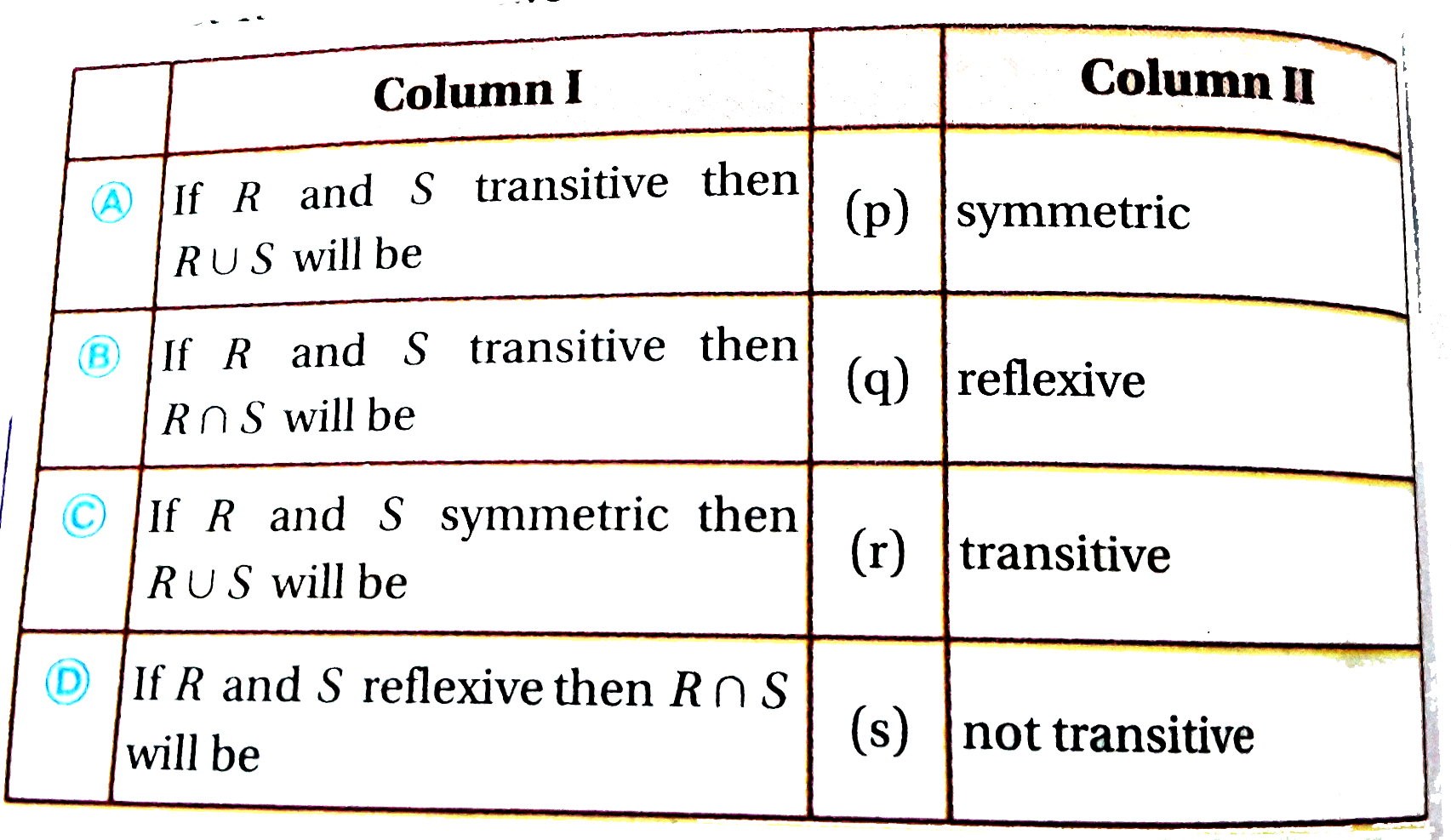Each question in this section has four choices A , B, C , and D out of which only one is coR Rect. Mark your choices as follows .
Let R be a relation on the set NN of the natural numbers defined by nRm <⇒ n is a factor of m.
Then R is transitive because Solution in Bengali
mRn, nRp ⇒ mRp
mRn cancelimplies nRm
mRm as m is multiple of m
None of these
The correct Answer is:A
Step by step video, text & image solution for Each question in this section has four choices A , B, C , and D out of which only one is coR Rect. Mark your choices as follows . Let R be a relation on the set N N of the natural numbers defined by nRm ltimplies n is a factor of m. Then R is transitive because by Maths experts to help you in doubts & scoring excellent marks in Class 12 exams.
Updated on:21/07/2023Topper's Solved these Questions
- RELATIONSBOOK - CHHAYA PUBLICATIONCHAPTER - RELATIONSEXERCISE - Sample Question for Competitive Examination (Assertion -Reason Type )
2 Videos
- RELATIONSBOOK - CHHAYA PUBLICATIONCHAPTER - RELATIONSEXERCISE - Sample Question for Competitive Examination (Matrix Match Type)
2 Videos
- RELATION AND FUNCTIONS BOOK - CHHAYA PUBLICATIONCHAPTER - RELATION AND FUNCTIONS EXERCISE - JEE Advanced Archive
3 Videos
- REVISION OF PREVIOUS TWO DIMENSIONAL COORDINATE GEOMETRY BOOK - CHHAYA PUBLICATIONCHAPTER - REVISION OF PREVIOUS TWO DIMENSIONAL COORDINATE GEOMETRY EXERCISE - Sample Questions for Competitive Exams E (Assertion - Reason Type )
2 Videos
Similar Questions
Each question in this section has four choices A , B, C , and D out of which only one is coR Rect. Mark your choices as follows .
Let R be a relation on the set NN of the natural numbers defined by nRm <⇒ n is a factor of m.
Statement -1 : R is not oan equivalence relation.
Statement -II: R is not symmetric
View SolutionLet R and S be two non - void relations on a set A.

View SolutionThe value of cot{23∑n=1cot−1(1+n∑k−12k)}is
View SolutionConsider two point A(2,5) and B(3,4) in the XY plane . P is a point divides the line segment AB externally in the ratio 2:5 .Find the co ordinate of P.
View SolutionLet R be a relation on the set N of naturalnumbers defined by nRm hArr n is a factor of m(ie.nim) Then R is
View SolutionLet R be a relation on the set N of natural numbers defined by n R m if n divides m. Then, R is
View SolutionLet N be the set of all natural niumbers and let R be a relation in N , defined by
R={(a,b):a is a factor of b}.
then , show that R is reflexive and transitive but not symmetric .
View SolutionLet N be the set of all natural numbers and let R be relation in N. Defined by
R={(a,b):a is a multiple of b}.
show that R is reflexive transitive but not symmetric .
View Solutionमाना की प्राकृत संख्याओं के सम्मुच्य N पर mRn<⇒(m−n)(m−n)=0 से परिभाषित सम्बन्ध R है| क्या R एक तुल्यता सम्बन्ध है?
View SolutionEach question in this section has four choices A , B, C , and D out of which only one is coR Rect. Mark your choices as follows .
Let R be a relation on the set NN of the natural numbers defined by nRm <⇒ n is a factor of m. Let R be the relation over the set of integers such that mRn if and only if m is a multiple of n
Then R is reflexive because
View SolutionEach question in this section has four choices A , B, C , and D out of which only one is coR Rect. Mark your choices as follows .
Let R be a relation on the set NN of the natural numbers defined by nRm <⇒ n is a factor of m. Then R is not symmetric because
View SolutionLet R be a relation in the set N of natural numbers, which is defined by nRm, if it divides m, then R
View Solutionप्राकृत संख्याओं के समुच्चय N पर सम्बन्ध R,nRm⇔n,m का एक गुणनखण्ड है (अर्थात् n/m) , के द्वारा परिभाषित है तब R है
View SolutionLet R be a relation on the set N of natural numbers defined by n R m iff n divides m. Then, R is (a) Reflexive and symmetric (b) Transitive and symmetric (c) Equivalence (d) Reflexive, transitive but not symmetric
View SolutionLet N be the set of all natural numbers and R be a relation in N defined by : R = {(a, b) : a is a factor of b} Show that R is reflexive and transitive.
View Solution
